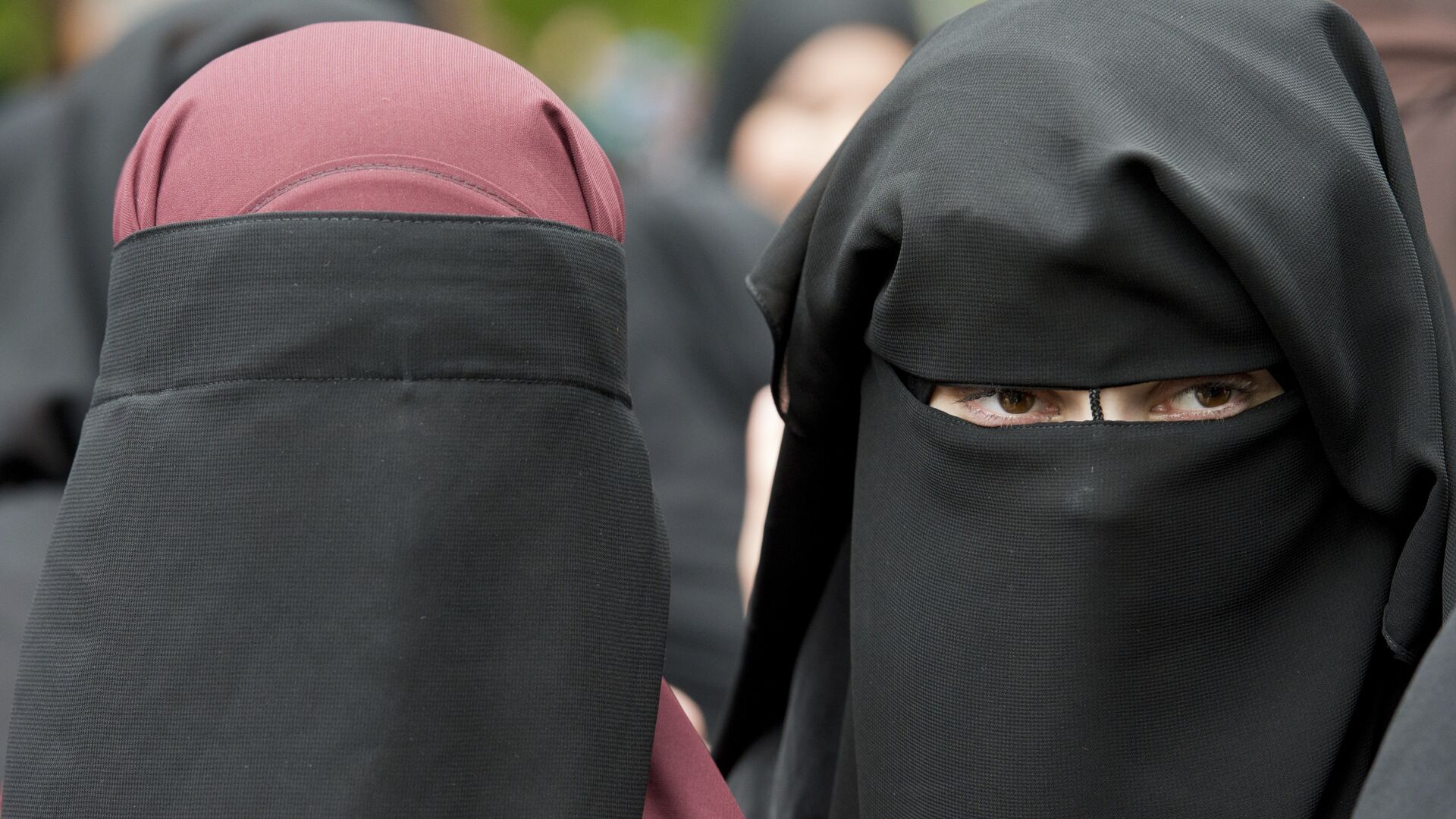https://sputnikglobe.com/20220507/talibans-supreme-leader-orders-afghan-women-to-don-all-covering-burqa-in-public-1095331750.html
Taliban's Supreme Leader Orders Afghan Women to Don All-Covering Burqa in Public
Taliban's Supreme Leader Orders Afghan Women to Don All-Covering Burqa in Public
Sputnik International
The Taliban has been accused of going back on several of its commitments on women's rights since it stormed to power in Afghanistan last August. At a meeting... 07.05.2022, Sputnik International
2022-05-07T11:23+0000
2022-05-07T11:23+0000
2022-12-08T18:02+0000
taliban
afghanistan
us
doha
organization of islamic cooperation (oic)
russia
pakistan
https://cdn1.img.sputnikglobe.com/img/106715/04/1067150406_0:0:3984:2242_1920x0_80_0_0_2381460ac6e17e7b66c30693c4f665e9.jpg
Taliban* chief Hibatullah Akhundzada has ordered the women in Afghanistan to wear a ‘chadori’, or a head-to-toe burqa, in public, as per a new decree issued on Saturday."... the chadori is traditional and respectful," the decree states, according to AFP.As per Reuters, the decree from Akhundzada was read out by a spokesperson from the Taliban's Ministry for the Propagation of Virtue and the Prevention of Vice at a press conference in Kabul.The women have been asked to "stay at home" if it's not essential to venture out.Young and older women are exempt from the new dress code, which was in previously in place in Afghanistan in the 1990s through 2001, when the Taliban first came to power in the central Asian nation.The new order placing curbs on women’s civil liberties comes after the Taliban in March postponed its earlier pledge to resume schooling for girls beyond grade six.The decision to bar girls from accessing primary education has attracted across the board criticism from the international community, including from Pakistan and the Organisation for Islamic Cooperation (OIC).A joint statement from the Western nations, including Canada, UK, European Union, the US and Norway, has also condemned the move.Since it stormed to power in Afghanistan last August, the Taliban has also imposed several restrictions on the movement of women, barring them from travelling without a male chaperone.The US Treasury froze around $9 billion dollars of Afghanistan’s federal assets in American-based financial institutions after the group’s takeover last August.The Biden administration decided to make available around $3.5 billion of Kabul’s assets for “humanitarian” relief in February this year, in the wake of warnings by international aid agencies that the nation was on the brink of a “humanitarian disaster” owing to a lack of food.The international community has said that formal diplomatic recognition of the Taliban hinges on the group’s ability to fulfil its international obligations, including forming an inclusive government with representation from ethnic minorities as well respecting women's rights and human rights.* Organisation under UN sanctions for terrorist activities
afghanistan
doha
pakistan
Sputnik International
feedback@sputniknews.com
+74956456601
MIA „Rosiya Segodnya“
2022
News
en_EN
Sputnik International
feedback@sputniknews.com
+74956456601
MIA „Rosiya Segodnya“
Sputnik International
feedback@sputniknews.com
+74956456601
MIA „Rosiya Segodnya“
taliban, afghanistan, us, doha, organization of islamic cooperation (oic), pakistan
taliban, afghanistan, us, doha, organization of islamic cooperation (oic), pakistan
Taliban's Supreme Leader Orders Afghan Women to Don All-Covering Burqa in Public
11:23 GMT 07.05.2022 (Updated: 18:02 GMT 08.12.2022) The Taliban has been accused of going back on several of its commitments on women's rights since it stormed to power in Afghanistan last August. At a meeting comprising delegates from Russia, the US, China and Pakistan last November, the Taliban representatives were told to guarantee women rights and ensure their access to education.
Taliban* chief Hibatullah Akhundzada has ordered the women in Afghanistan to wear a ‘chadori’, or a head-to-toe burqa, in public, as per a new decree issued on Saturday.
"... the chadori is traditional and respectful," the decree states, according to AFP.
Only the eyes of the women must be visible in public, the Persian language order states.
As per Reuters, the decree from Akhundzada was read out by a spokesperson from the Taliban's Ministry for the Propagation of Virtue and the Prevention of Vice at a press conference in Kabul.
It states that the controversial dress was being introduced "in order to avoid provocation when meeting men who are not mahram (adult close male relatives)".
The women have been asked to "stay at home" if it's not essential to venture out.
Furthermore, the Taliban order also warns that the woman’s father or closest male relative could be imprisoned or lose their jobs should the ladies be found violating the new dress code in public.
Young and older women are exempt from the new dress code, which was in previously in place in Afghanistan in the 1990s through 2001, when the
Taliban first came to power in the central Asian nation.
The new order placing curbs on women’s civil liberties comes after the Taliban in March postponed its earlier pledge to resume schooling for girls beyond grade six.
The decision to bar girls from accessing primary education has attracted across the board criticism from the international community, including from Pakistan and the Organisation for Islamic Cooperation (OIC).
A joint statement from the Western nations, including Canada, UK, European Union, the US and Norway, has also condemned the move.
Since it stormed to power in Afghanistan last August, the Taliban has also imposed several restrictions on the movement of women, barring them from travelling without a male chaperone.
The US Treasury
froze around $9 billion dollars of Afghanistan’s federal assets in American-based financial institutions after the group’s takeover last August.
The Biden administration decided to make available around $3.5 billion of Kabul’s assets for “humanitarian” relief in February this year, in the wake of warnings by international aid agencies that the nation was on the brink of a “humanitarian disaster” owing to a lack of food.
The international community has said that formal diplomatic recognition of the Taliban hinges on the group’s ability to fulfil its international obligations, including forming an inclusive government with representation from ethnic minorities as well respecting women's rights and human rights.
* Organisation under UN sanctions for terrorist activities




